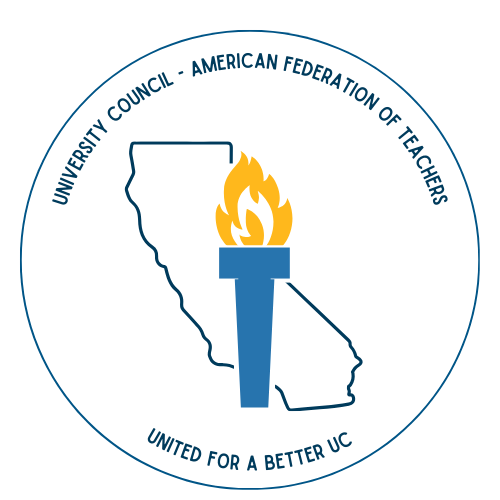In August, the Trump Administration suspended over $584 million of federal research grants to UCLA and issued a series of demands to the UC Board of Regents that UCLA would be required to meet in order for the grant-funding to be restored. UCLA was the first public university to receive such a demand from the administration and received the steepest monetary demands, as the Trump administration demanded over $1 billion. UC-AFT joined with other campus unions to insist that any negotiations over the terms of our employment would violate the terms of our collective bargaining agreements and filed a cease and desist. We were particularly concerned about demands made at other campuses that threatened to:
- eliminate access to gender-affirming care at UC hospitals
- eliminate “diversity-based” student programs and scholarships
- prohibit “diversity” considerations from hiring, retention, and promotion processes
- punish immigrant faculty, staff, and students for expressing “anti-Western, anti-American, or antisemitic” beliefs
- enforce significant restrictions on campus protests and academic freedom
The financial penalties demanded by the Trump administration also threatened to devastate the UC’s finances, likely resulting in hundreds of layoffs across the state. We made our position clear to UC: No Concessions, No Capitulation, No Cuts!
Until recently, however, the exact terms of the Trump administration’s demands remained unclear, as UCLA’s administration refused to share a copy of the letter from the administration or discuss any of its specific terms. In September, the UCLA Faculty Association, along with its statewide body CUCFA, sued the UC to demand access to the Trump Administration’s letter. In a ruling on Oct. 23rd, the judge sided with the Faculty Association, ordering the UC to release the information immediately. But the UC instead petitioned the Supreme Court of California to block the release of the UCLA demand letter. Yesterday, the Supreme Court sided with the Faculty Association, ordering the letter to be released immediately.
“UC is a public university. It provides education, jobs, and medical care. There are faculty, staff, workers, alumni, students, and parents who care about and will be affected by these negotiations,” she said. “We went to court for us, but also for them — because UC’s lack of transparency isn’t consistent with UC’s position as a major public good in our state.”
